| By Marcus Simmons | Tuesday, April 30th 2013, 15:45 GMT |
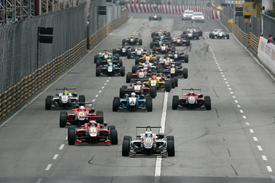 FIA Single-Seater Commission president Gerhard Berger has given the clearest indication yet that this year's Macau Grand Prix Formula 3 race will not include cars powered by engines built to the new regulations.
FIA Single-Seater Commission president Gerhard Berger has given the clearest indication yet that this year's Macau Grand Prix Formula 3 race will not include cars powered by engines built to the new regulations.
Moves had been made for Macau, F3's flagship race, to be solely for all-new powerplants this November to herald the new rules, which will be mandatory in the FIA F3 European Championship in 2014.
But the scheduling of the final two rounds of this year's European championship, at Hockenheim and Paul Ricard, does not allow teams enough time to convert their cars ready for air-freighting to the Far-Eastern event.
With the new engines offering approximately 10 per cent more power, performance-balancing measures have been weighed up by the FIA.
But AUTOSPORT understands that there is not enough room to incorporate the ballast on the current Dallara chassis if this was to be accomplished on weight, and there are reliability concerns if it was done via engine air restrictor tweaks.
"We are looking at different scenarios," said Berger, who was a podium finisher in Macau in 1983. "There is one logic: the engines we are running at the moment."
The likely Macau rules will put teams from the Japanese championship, which did adopt the new regulations for 2013, in a difficult situation. To compete in Macau, they would have to convert their cars back to old-spec engines.
Regarding the Japanese situation, Berger said: "It's a limited number of cars [seven appeared for the opening round in the main championship class]. We have to find the right thing for the sport altogether."
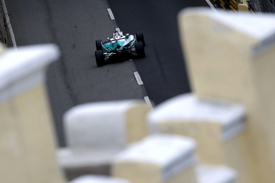 The move could jeopardise participation from the Japanese in Macau.
The move could jeopardise participation from the Japanese in Macau.
Top team TOM'S has won more the race more times than any other (with five victories) and has the longest unbroken record of participation (since 1991).
But team boss Susumu Koumi told AUTOSPORT that reverting to old-spec engine, electronics, set-up and driving style (due to the different characteristics of the new engine) would make it extremely difficult to be competitive.
AUTOSPORT SAYS
Marcus Simmons
(@marcussimmons54)
If Joseph Heller were alive today, he would surely be greatly amused by the current situation in Formula 3.
Here's the deal: the Japanese have the only championship running to current FIA rules, yet look likely to be barred from taking their machinery (in its current state) to the FIA's flagship F3 race, because it would comfortably beat all the cars from the FIA's own championship, none of which run to FIA rules.
This particular Catch 22 is an inevitable consequence of events dating back to March 31 2012, the deadline for engine makers wishing to lodge their intention to build new-rules powerplants - and therefore to be granted homologation – for 2013.
For various reasons, Mercedes and Volkswagen didn't meet that deadline. And, with their support absolutely vital to the FIA as it strove to rebuild F3, they (along with Tomei, which did meet the deadline but never really pushed to build a new ThreeBond engine for 2013) were allowed to field their old units in European F3 this season, with guarantees from Merc and VW that they would come on board with the new rules for 2014.
So, as far as European F3 was concerned, the new engines were swept under the carpet – without actually being banned – for 12 months.
But the inevitable bulge in that carpet is Macau, the fact that the Japanese pressed ahead in good faith with the new rules for 2013, and the logistical impossibility for the Europeans to convert their cars.
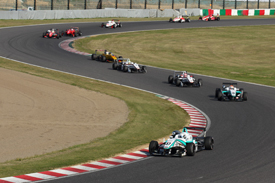 Having arrived at this point, it's difficult to see what else the FIA can do for Macau, but our sources indicate that the Japanese are none too impressed.
Having arrived at this point, it's difficult to see what else the FIA can do for Macau, but our sources indicate that the Japanese are none too impressed.
The Japanese have long been an intrinsic part of F3, and TOM'S, Mugen and Toda are all racing new engines this season. Their participation is vital for the long-term strength of the category.
What's more, the TOM'S record in Macau is superior to any European team. The squad has taken victory there with Rickard Rydell, Peter Dumbreck, Darren Manning, Oliver Jarvis and Keisuke Kunimoto.
Berger is correct in saying there is a need to "do the right thing for the sport". Certainly, barring the new engines from Macau 2013 appears to be the 'least wrong' thing, because if they were allowed to compete then the European teams who provide the bulk of the field would find it very tough to sell drives for the event.
That said, the FIA clearly needs to do some bridge-building with the Japanese who, if this goes through, will have been penalised for acting throughout with the best of intentions.


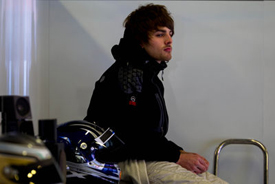 Lewis Williamson has completed the 2013 GP3 Series driver line-up by filling the final vacancy at new team Bamboo.
Lewis Williamson has completed the 2013 GP3 Series driver line-up by filling the final vacancy at new team Bamboo.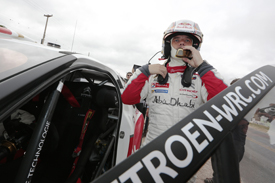 Sebastien Loeb is adjusting his driving style closer to Citroen team-mate Mikko Hirvonen's as he sticks with a compromise set-up for his World Rally Championship return in Argentina.
Sebastien Loeb is adjusting his driving style closer to Citroen team-mate Mikko Hirvonen's as he sticks with a compromise set-up for his World Rally Championship return in Argentina. Sebastien Ogier stretched his Rally Argentina lead to 16.3 seconds over Sebastien Loeb by the end of Thursday's leg.
Sebastien Ogier stretched his Rally Argentina lead to 16.3 seconds over Sebastien Loeb by the end of Thursday's leg.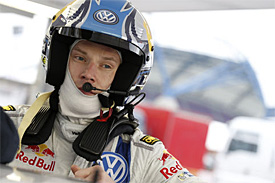 Volkswagen driver Jari-Matti Latvala set fastest time at this morning's Rally Argentina qualifying stage.
Volkswagen driver Jari-Matti Latvala set fastest time at this morning's Rally Argentina qualifying stage. Jari-Matti Latvala has gambled on the weather staying dry, despite the threat of rain, on tomorrow's opening leg of Rally Argentina.
Jari-Matti Latvala has gambled on the weather staying dry, despite the threat of rain, on tomorrow's opening leg of Rally Argentina. FIA Single-Seater Commission president Gerhard Berger has given the clearest indication yet that this year's Macau Grand Prix Formula 3 race will not include cars powered by engines built to the new regulations.
FIA Single-Seater Commission president Gerhard Berger has given the clearest indication yet that this year's Macau Grand Prix Formula 3 race will not include cars powered by engines built to the new regulations. The move could jeopardise participation from the Japanese in Macau.
The move could jeopardise participation from the Japanese in Macau. Having arrived at this point, it's difficult to see what else the FIA can do for Macau, but our sources indicate that the Japanese are none too impressed.
Having arrived at this point, it's difficult to see what else the FIA can do for Macau, but our sources indicate that the Japanese are none too impressed.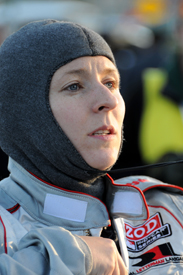 Pippa Mann will make her second Indianapolis 500 start next month after securing a drive with Dale Coyne Racing.
Pippa Mann will make her second Indianapolis 500 start next month after securing a drive with Dale Coyne Racing.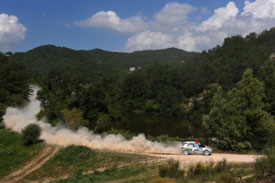 The San Marino Rally has lost its place on the 2013 European Rally Championship schedule.
The San Marino Rally has lost its place on the 2013 European Rally Championship schedule.